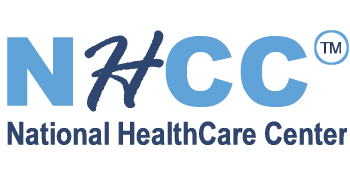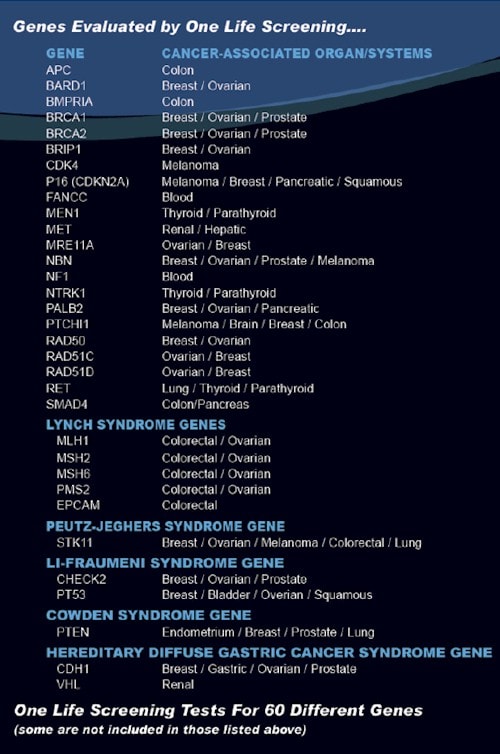Genetic Risk Assessment
COMPREHENSIVE HEREDITARY CANCER RISK ASSESSMENT
National HealthCare Center is pleased to offer its clients a comprehensive suite of genetic tests, allowing the physicians we serve to provide truly personalised healthcare. Coupling the lates aboratory technologies with highly trained genomic scientists and counselors keeps our clients cutting edge.
Next Generation Sequencing (NGS) based screening for mutations known to affect an individual’s risk of developing hereditary cancer is performed at our state-of-the-art, CLIA-certified facility. NHCC test results, along with a treating physician’s expertise, are used to make better informed treatment and/or monitoring decisions.
EXAMPLES OF COMMON HEREDITARY CANCERS & CANCER SYNDROMES
- Hereditary Breast and Ovarian Cancer (BRCA1, BRCA2)
- Lynch Syndrome (MLH1, MSH2, MSH6,
- Colon Cancer (APC, BMPR1A, EPCAM) PMS2, EPCAM)
- Uterine Cancer (MLH1, MSH2, EPCAM, MSH6, PMS2)
- Cowden Syndrome (PTEN)
- Endometrial Cancer (EPCAM, MLH1, MSH2, MSH6) LiFraumeni Syndrome (TP53
WHO SHOULD GET TESTED
If you suspect that you or someone you know may have an increased risk for cancer-based on factors like abnormal familial cancer history or membership in an at-risk ethnic population (such as Ashkenazi Jewish ancestry)-you may want to discuss advanced genomic testing options with your healthcare provider. If one of your family members, however distant, has been diagnosed with cancer, there is a chance that you inherited a gene mutation that not only increases your personal risk of developing cancer, but may also be to passed on to your offspring-potentially increasing their risk of developing cancer. Mutation of the genes known to be associated with an increased risk of developing cancer, like those involved in DNA repair, often result in cancers that appear unique. An individual’s familial cancer history may include a number of seemingly distant cancer cases. This mistakingly leads to the belief that the cancers are un-related, and not caused by a hereditary mutation.
BENEFITS OF TESTING
Those who are carriers of hereditary cancer gene mutations may be at risk of developing cancer earlier in life, as compared to members of the general population. The sooner genetic testing is performed, the more likely it is that this increased risk can be managed appropriately. Numerous professional practice guidelines describe increasingly stringent monitoring protocol- published specifically for management of patients in whom deleterious mutation has been identified.
These protocols may suggest the increased use of routine screening tools like mammograms and colonoscopies. Depending on the severity of the identified mutations), they may also suggest discussion of more aggressive options like prophy- lactic surgical intervention. Remember, your healthcare professional is your most valuable source of information.
COMPREHENSIVE HEREDITARY CANCER RISK ASSESSMENT
National HealthCare Center is pleased to offer its clients a comprehensive suite of genetic tests, allowing the physicians we serve to provide truly personalised healthcare. Coupling the lates aboratory technologies with highly trained genomic scientists and counselors keeps our clients cutting edge.
Next Generation Sequencing (NGS) based screening for mutations known to affect an individual’s risk of developing hereditary cancer is performed at our state-of-the-art, CLIA-certified facility. NHCC test results, along with a treating physician’s expertise, are used to make better informed treatment and/or monitoring decisions.
UNDERSTANDING THE TYPES OF GENETIC HEART DISEASE
-
- BICUSPID AORTIC VALVE DISEASE, when your heart valve has only two flaps instead of three, causing it to leak or narrow.
-
CARDIOMYOPATHY, in which your heart muscle becomes enlarged, thick or stiff. This includes hypertropic cardiomyopathy, which can cause cardiac arrest in younger people, especially young athletes.
-
MARFAN SYNDROME, which damages the connective tissues in your heart and blood vessels, making you more prone to aneurysms.
-
ARRHYTHMIA, an irregular heartbeat, including Brugada syndrome, long QT syndrome and Wolff-Parkinson-White syndrome.
-
CARDIAC AMYLOIDOSIS, where your heart builds up protein deposits that make it harder to pump.
-
LOEYS-DIETZ SYNDROME, a connective tissue disorder that can cause an aortic aneurysm
WHY GET TESTED
Advanced Knowledge – This test might give you the advance knowledge that you might develop heart disease or that you might have 50% increased risk of suffering a heart attack, which can help you make decisions that will limit the risk. Mutations in genes can affect the way the heart cells communicate, the strength of the heart muscle, and affect the heart rhythm condition, resulting in fast, chaotic heartbeats.Identifying these genetic factors now plays an important role in the disease prognosis, therapy and therefore, the outcome.
INHERITED HEART DISEASE
While you can’t control the genes you’re born with, you can take control of how they affect your life. If you’re diagnosed with a genetic heart condition, we will help you and your family members understand the risks and what you can do about them. Our specialists are among the most experienced in the Midwest in detecting and treating all types of inherited heart disease. We’re here to help you and your loved ones – live life to the fullest.
WHAT IS INHERITED HEART DISEASE?
Unlike conditions tied to aging or lifestyle, inherited heart diseases (sometimes called familial or genetic heart diseases) are passed on through your parent’s genes. That means it runs in the family.
If you have an inherited heart disease, we’ll care for you with compassion and nationally recognized clinical excellence and offer genetic testing and advanced diagnosis to your entire family. This helps your loved ones prevent possible serious complications from developing, giving everyone peace of mind now and for the future.
These protocols may suggest the increased use of routine screening tools like mammograms and colonoscopies. Depending on the severity of the identified mutations), they may also suggest discussion of more aggressive options like prophy- lactic surgical intervention. Remember, your healthcare professional is your most valuable source of information.

